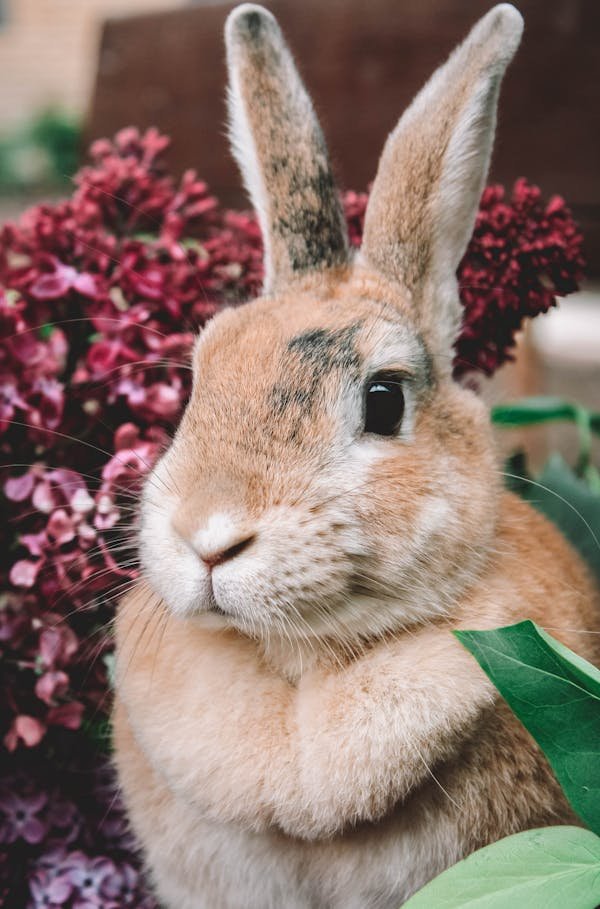How to Keep Rabbits out of Garden
Discover effective strategies to protect your garden from pesky rabbits. Our guide on "How to Keep Rabbits out of Garden" offers tips and tricks to safeguard your plants.
Ah, the joys of gardening! There's nothing quite like seeing your hard work blossom into vibrant flowers and lush vegetables. But then, out of nowhere, those cute, fluffy rabbits appear, turning your garden into their personal buffet. It's enough to make any gardener hop mad! If you're finding yourself at your wit's end, fear not. In this guide, we'll explore various strategies on How to Keep Rabbits out of Garden areas, ensuring your plants stay safe and your garden remains a sanctuary for you, not the bunnies.
Understanding the Rabbit Problem
Before jumping into solutions, it's crucial to understand why rabbits are so drawn to your garden.
Why Rabbits Love Gardens
Herbivore Diet: Rabbits are strict herbivores, meaning they exclusively eat plant material. Gardens provide a rich, diverse buffet of their favorite foods.
Tender Shoots: They are particularly attracted to tender shoots and young plants, which are easier to chew and digest.
Leafy Greens: Leafy greens like lettuce, spinach, and kale are especially tempting for rabbits, offering a soft texture and high water content.
Young Plants: Young, newly sprouted plants are a top choice for rabbits because they are fresh and nutrient-rich.
Accessible Food Source: Gardens often have a variety of plants growing close together, providing rabbits with an easy and accessible food source.
Signs of Rabbit Damage
Clean-Cut Stems: Rabbits have sharp teeth that leave clean, angled cuts on plant stems, making it easy to identify their feeding.
Nibbled Leaves: They tend to nibble on leaves, often leaving them partially eaten or with bite marks.
Small, Round Droppings: Rabbit droppings are small, round, and dark, often found scattered around areas where they've been feeding.
Low-Growing Plants Targeted: Rabbits typically target plants that grow close to the ground, as these are easily accessible and provide cover.
45-Degree Angle Cuts: The characteristic 45-degree angle cut on stems is a common sign of rabbit feeding behavior.
Understanding these signs and behaviors can help you identify rabbit damage and implement effective deterrents to protect your garden.
Fencing: The First Line of Defense
Building a Rabbit-Proof Fence
Fencing is one of the most effective ways to keep rabbits out of your garden.
Material Matters:
Chicken Wire or Hardware Cloth: Use sturdy materials like chicken wire or hardware cloth with holes no larger than 1 inch. This small mesh size prevents even tiny rabbits from squeezing through.
Durability: Choose galvanized or coated materials to resist rust and weathering, ensuring long-term effectiveness.
Height and Depth:
Height: A fence should stand at least 2-3 feet high, as rabbits are capable jumpers. This height deters most adult rabbits from leaping over.
Depth: To stop rabbits from burrowing underneath, bury the bottom 6-12 inches of the fence underground. Alternatively, you can angle the buried portion outward to further deter digging.
Gates and Openings:
Secure Gates: Ensure all gates and entrances are securely closed and latch tightly. Rabbits are surprisingly persistent and can exploit even small gaps.
Sealing Openings: Check for any openings or gaps in the fence, especially around gate hinges and latches, and seal them properly.
Maintenance Tips
Check Regularly:
Routine Inspections: Regularly inspect your fence for any holes, gaps, or damage caused by weather, animals, or garden activities.
Immediate Repairs: Address any issues as soon as they are detected to maintain the fence's integrity and effectiveness.
Reinforce Weak Spots:
Additional Wire or Stakes: Reinforce weak or vulnerable areas with extra wire or stakes. This includes sections where the fence may be sagging or where animals have attempted to dig.
Upgrade Materials: If necessary, upgrade to stronger materials or add an electric wire along the top to further deter persistent rabbits.
Using a well-constructed and properly maintained fence is one of the most effective ways to protect your garden from rabbit damage. This physical barrier, when combined with regular inspections and timely repairs, can significantly reduce the likelihood of rabbits accessing and feasting on your plants.
Natural Deterrents: Scaring Rabbits Away
Using Plants as Deterrents
Believe it or not, some plants can actually repel rabbits.
Aromatic Herbs:
Lavender: The strong fragrance of lavender is unpleasant to rabbits. Planting it around your garden perimeter can act as a natural barrier.
Rosemary: Another herb with a potent scent, rosemary not only repels rabbits but also adds a lovely aroma to your garden.
Sage: Sage's pungent aroma is off-putting to rabbits, making it an excellent choice for keeping these critters at bay.
Bitter-Tasting Plants:
Marigolds: Known for their bright blooms and strong scent, marigolds are often avoided by rabbits. They can be planted around the garden's edges or interspersed with other plants.
Garlic: The strong taste and smell of garlic are deterrents for rabbits. Plant garlic cloves throughout your garden to keep them away.
Onions: Similar to garlic, onions have a strong, unpleasant flavor and scent that rabbits generally avoid.
Homemade Repellents
Garlic and Chili Spray:
Ingredients: Crush a few cloves of garlic and mix with chili powder and water.
Application: Spray this mixture around your garden's perimeter and on the plants you want to protect. The strong scent and taste will deter rabbits, making your garden less appealing to them.
Soap Shavings:
Materials: Use a strong-smelling soap, such as those with eucalyptus or peppermint oils.
Application: Grate the soap and sprinkle the shavings around your garden. The potent smell can act as a natural repellent, discouraging rabbits from entering the area.
By incorporating these plants and homemade repellents, you can create a less inviting environment for rabbits in your garden. These natural methods are not only effective but also safe for your plants and other wildlife. Remember to reapply sprays and replenish soap shavings after rain or irrigation to maintain their effectiveness.
Commercial Repellents: Extra Measures
Choosing the Right Product
If natural methods aren't cutting it, there are plenty of commercial repellents available.
Granules and Sprays:
Specialized Formulas: Look for granules and sprays specifically formulated to repel rabbits. These products often contain natural deterrents like predator urine, which mimics the scent of predators, making rabbits feel unsafe. Bitter agents are also commonly used to make plants taste unappealing.
Easy Application: These repellents are easy to apply around the garden's perimeter or directly on plants. Granules can be sprinkled around the base of plants, while sprays can be applied to foliage.
Electronic Devices:
Ultrasonic Repellents: Ultrasonic devices emit high-frequency sounds that are unpleasant to rabbits but inaudible to humans. These devices can cover a significant area and are particularly useful in larger gardens.
Motion-Activated Sprinklers: Another electronic option is a motion-activated sprinkler, which releases a burst of water when movement is detected. This startles rabbits and conditions them to avoid the area.
Application Tips
Follow Instructions:
Manufacturer Guidelines: Always adhere to the manufacturer's instructions when applying commercial repellents. Proper application ensures effectiveness and minimizes the risk of harming other animals or plants.
Safety Precautions: Some products may require gloves or protective eyewear during application. Ensure you're using the product safely and as directed.
Reapply Regularly:
After Rain: Many repellents, especially sprays and granules, lose their effectiveness after rain or heavy watering. Reapply these products as recommended, usually every few weeks or after rainfall.
Seasonal Adjustments: Be aware of seasonal changes that may require more frequent applications, such as increased rabbit activity in spring or fall.
Using commercial repellents can be an effective solution when natural methods aren't sufficient. By carefully selecting and correctly applying these products, you can protect your garden from rabbit damage while maintaining a safe environment for other wildlife and pets.
Using Decoys and Scare Tactics
Scarecrows and Reflective Objects
Rabbits are easily spooked, so using decoys can be effective.
Scarecrows: A classic choice, scarecrows can be dressed up to look more lifelike.
Reflective Tape and CDs: Hang reflective tape or old CDs around your garden. The flashing light can scare rabbits away.
Motion-Activated Devices
For a high-tech solution, consider motion-activated devices.
Sprinklers: Motion-activated sprinklers can startle rabbits and keep them at bay.
Lights and Sounds: Some devices emit sudden lights or noises to scare away intruders.
Encouraging Natural Predators
Attracting Predators
Nature has its own way of controlling rabbit populations, so why not use it to your advantage?
Owls and Hawks: Install owl boxes or perch poles to attract birds of prey.
Foxes and Cats: While you can't exactly invite these predators over for dinner, knowing they frequent the area can naturally reduce the rabbit population.
Using Pets
Dogs: A dog can be a great deterrent. Just make sure your pet doesn't harm the rabbits or get into the garden themselves.
Conclusion
Keeping rabbits out of your garden doesn't have to be a losing battle. With a combination of fencing, natural and commercial repellents, and some clever scare tactics, you can protect your precious plants from these furry invaders. Remember, the key to success is persistence and adaptability. If one method doesn't work, don't be afraid to try another. By following the strategies outlined in this How to Keep Rabbits out of Garden guide, you'll be well on your way to a rabbit-free garden that you can enjoy all season long. Happy gardening!
Frequently Asked Questions
Are there any plants that rabbits won't eat?
While rabbits will eat a wide variety of plants, they tend to avoid aromatic herbs like lavender and rosemary, as well as bitter-tasting plants like marigolds and garlic.
How can I tell if rabbits are eating my plants?
Look for clean, angled cuts on stems and nibbled leaves. Rabbit droppings, which are small and round, are another sign.
Are commercial rabbit repellents safe for my garden?
Most commercial repellents are safe for gardens, but always read the label to ensure they won't harm your plants or pets.
Can motion-activated devices scare away other animals?
Yes, motion-activated sprinklers and lights can scare away other animals as well. This can be both a benefit and a drawback, depending on the wildlife in your area.
Do rabbits come out during the day?
Rabbits are crepuscular, meaning they are most active during dawn and dusk. However, they can be seen during the day, especially if they feel safe.

































